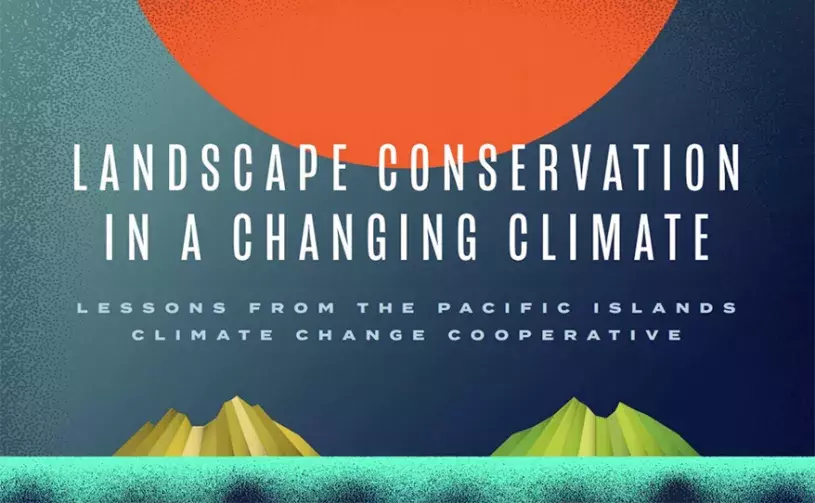
“Landscape conservation,” a now common term in conservation biology, emphasizes the importance of planning at scales that encompass ecological processes and species migrations, and addresses large-scale environmental threats. Formal frameworks for evaluating the effectiveness of these efforts are rare, however, and made difficult because these multi-scalar efforts involve many actors over multiple jurisdictions and long timescales. Recognizing the need for collaborative responses to large-scale environmental stressors such as climate change, the Department of the Interior supported a network of Landscape Conservation Cooperatives (LCCs) from 2009 until 2018. As one of these twenty-two LCCs, the Pacific Islands Climate Change Cooperative (PICCC) was established with the charter purpose of assisting those who manage native species, island ecosystems, and key cultural resources in adapting their management to climate change for the continuing benefit of the people of the Pacific Islands. Guided by a diverse steering committee of land/resource managers, the PICCC serviced a vast area across Hawaiʻi and the US-Affiliated Pacific Islands. This report presents key findings from evaluative research investigating PICCC’s achievements in the Hawaiian Islands between 2009 and 2018. Based on interviews and a survey, the report describes the foundational conditions from which the PICCC set out to establish a landscape conservation framework, the challenges it faced, its goals and achievements, and transferable lessons from the experience for any conservation community working with limited resources across large expanses of land and ocean. The research underlying this report serves as a record of the unique landscape conservation and climate adaptation approach developed by the PICCC’s steering committee and partners over the course of their collaboration, and points to the benefits that have been and could be achieved in sustained landscape-scale conservation efforts.
See summary Introduction, Research Highlights, and Recommendations
Wendy Miles: past work and CV
Susanne Moser: www.susannemoser.com
“Landscape conservation,” a now common term in conservation biology, emphasizes the importance of planning at scales that encompass ecological processes and species migrations, and addresses large-scale environmental threats. Formal frameworks for evaluating the effectiveness of these efforts are rare, however, and made difficult because these multi-scalar efforts involve many actors over multiple jurisdictions and long timescales. Recognizing the need for collaborative responses to large-scale environmental stressors such as climate change, the Department of the Interior supported a network of Landscape Conservation Cooperatives (LCCs) from 2009 until 2018. As one of these twenty-two LCCs, the Pacific Islands Climate Change Cooperative (PICCC) was established with the charter purpose of assisting those who manage native species, island ecosystems, and key cultural resources in adapting their management to climate change for the continuing benefit of the people of the Pacific Islands. Guided by a diverse steering committee of land/resource managers, the PICCC serviced a vast area across Hawaiʻi and the US-Affiliated Pacific Islands. This report presents key findings from evaluative research investigating PICCC’s achievements in the Hawaiian Islands between 2009 and 2018. Based on interviews and a survey, the report describes the foundational conditions from which the PICCC set out to establish a landscape conservation framework, the challenges it faced, its goals and achievements, and transferable lessons from the experience for any conservation community working with limited resources across large expanses of land and ocean. The research underlying this report serves as a record of the unique landscape conservation and climate adaptation approach developed by the PICCC’s steering committee and partners over the course of their collaboration, and points to the benefits that have been and could be achieved in sustained landscape-scale conservation efforts.
See summary Introduction, Research Highlights, and Recommendations
Wendy Miles: past work and CV
Susanne Moser: www.susannemoser.com




